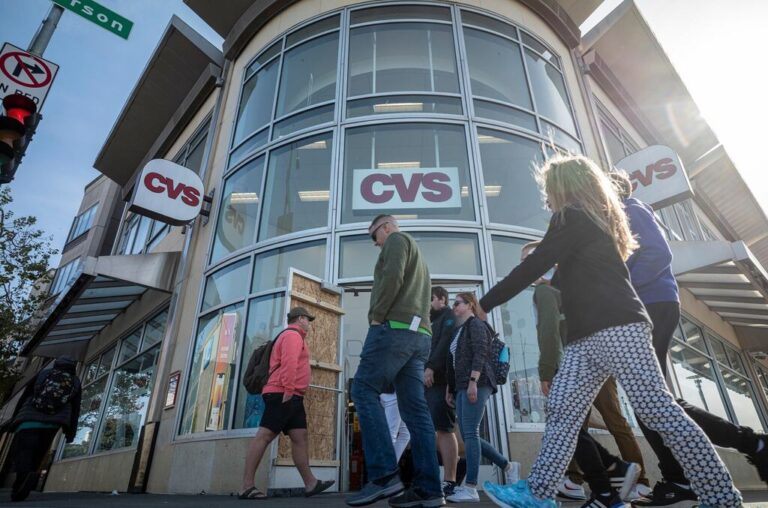PROVIDENCE – Pushing back against a US Department of Justice lawsuit alleging its pharmacists unlawfully dispensed thousands of prescriptions for opioids and other controlled substances, CVS Pharmacy, Inc. is asking a federal judge to dismiss most of the claims, arguing prosecutors have failed to provide key facts, including information about the doctors who prescribed them.
In a 45-page motion filed in US District Court in Providence on Tuesday, attorneys for the Woonsocket, R.I.-based company wrote the civil lawsuit filed in December by the US attorney’s office in Rhode Island fails to show prescribing doctors behind more than 9,500 prescriptions in question wrote them unlawfully – a crucial element required to prove wrongdoing under federal law, they argue.
“For the vast majority of the prescriptions identified in the Complaint … the government alleges no facts about the doctors, their practices, their treatment decisions, or their care of their patients,” the motion states. “It does not even identify the doctors. It erases the doctor-patient relationship from the equation.”
Jim Martin, a spokesman for the US attorney’s office, did not immediately return a request for comment on Wednesday morning.
In the lawsuit, officials allege CVS, the nation’s largest pharmacy chain, violated the Controlled Substances Act by knowingly filling prescriptions that lacked a legitimate medical purpose, were not valid, or weren’t issued in the usual course of professional practice since October 2013. Officials also allege the company violated the False Claims Act because it sought reimbursement from federal health care programs.
Authorities blamed the company’s “corporate-mandated performance metrics, incentive compensation, and staffing policies” for contributing to dangerous issues, and have argued CVS took those steps even though it knew its pharmacists were pressured to fill prescriptions as quickly as possible, without being able to assess their legitimacy.
“CVS failed to exercise its critical role as gatekeeper of dangerous prescription opioids and, instead, facilitated the illegal distribution of these highly addictive drugs, including by pill mill prescribers,” then-Rhode Island US Attorney Zachary A. Cunha said in a statement when announcing the lawsuit in December.
In the motion filed Tuesday, Robert Clark Corrente, an attorney representing CVS, asked a judge to dismiss claims the company violated the two laws, arguing the DOJ did not show doctors who wrote the prescriptions did so unlawfully, as required.
Citing a list of 9,000 prescriptions filed by prosecutors in court, Corrente wrote the complaint “pleads no facts about [the doctors’] practices, their care of their patients, or the bases of their prescribing decisions.”
“Remarkably, it does not even identify the doctors. The Complaint fails wholesale to allege facts that give rise to a plausible inference that doctors wrote any of the prescriptions … unlawfully,” the motion states.
Corrente also claims the lawsuit “seeks to weaponize” a voluntary program CVS established to combat unlawful prescribing.
In the complaint, officials allege that by operating the program, CVS had information showing “seven named pill mill prescribers were prescribing unlawfully, but that it did not select them for a corporate block (or did not block them soon enough),” according to Corrente.
In attempting to prove violations of the Controlled Substances Act, the lawsuit relies “not on the alleged knowledge of the pharmacist who actually filled the prescriptions, but rather on the alleged knowledge of corporate personnel at CVS headquarters” through the program, the motion states.
That argument is invalid, Corrente wrote.
“It is the pharmacists who must have knowledge,” the motion states. “Not other people, elsewhere at the company, who are not present at the pharmacy counter, who have no realtime knowledge of the prescription presented, who do not know or see the patient for whom it is written, and who have no involvement in the pharmacist’s assessment of the prescription and decision to fill it.”
Additionally, Corrente notes that in an “unusual feature of this case” the government “had extensive information about the prescriptions in question and still accepted them for reimbursement,” and claims officials therefore were aware of the same alleged “red flags” behind each unlawful prescription.
“In fact, the government possessed even more information when it made payment,” the motion states. “In addition to all the information that it received about the prescriptions themselves, it separately collected data from the prescribing doctors showing the services they provided for each patient and their diagnoses.
“Accordingly, the government possessed information about the medical condition of the patient, the doctor’s diagnoses, the frequency of the doctor’s examinations, tests the doctor did or did not order, and more.”
The motion also states prosecutors failed to allege any facts to support claims that CVS violated restrictions on refills of controlled substances.
Corrente requested the court also dismiss counts of fraud, payment by mistake, and unjust enrichment outlined in the lawsuit, and requested 90 minutes to argue the motion before a judge.
In an email on Wednesday, Kara Page, a spokesperson for CVS, wrote the company had no additional comment on the lawsuit.
CVS, which boasts more than 9,000 pharmacies across the United States, has previously said it would “vigorously” defend itself against what it described as a “misguided federal lawsuit.”
According to court records, prosecutors have until June 4 to file a response to the motion.
Material from previous Globe stories was used in this report.



Comment count: